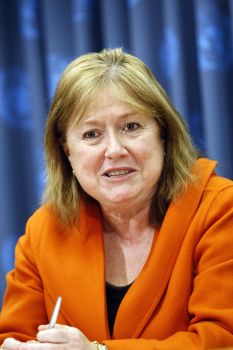UNITED NATIONS, Mar 2, 2012 (IPS) - As Secretary-General Ban Ki-moon announced Friday the appointments of two of his most senior officials, he has also broken new ground in his global search for a new team: an advertisement in a British weekly calling for applicants for vacant high-ranking jobs in the Secretariat.
But the ad in the current issue of the Economist is confined to only four senior posts in the Secretariat: the under-secretaries general (USG) for public information; management; economic and social affairs; and general assembly and conference management.
"Advertising available posts in the Economist is not new," Samir Sanbar, a former assistant secretary-general and head of the department of public information, told IPS. "But advertising USG posts is new."
"A decision to advertise USG posts seems to be a move in the right direction, as long as the final decision remains really with the secretary-general, who is the only accountable official selected by the Security Council and elected by the General Assembly," said Sanbar, who has served under five different secretaries-general.
Although the advertisement gives the impression that Ban is being transparent in his appointments, he has named several new officials without recourse to advertising, including the two he announced Friday: Jan Eliasson of Sweden, a former president of the General Assembly, as the new deputy secretary-general, and Sussana Malcorra of Argentina, the former USG for Field Support, as the new chief of staff.
At a press briefing Friday, Ban said his four USG appointments (spelled out in the ad) will be "open and public nominations".
However, a former senior U.N. official who served under Kofi Annan was sceptical of the ad, even though he said it was the right move.
Speaking off the record, he told IPS, "Why the selectiveness (in advertising only four of the posts)? Why not others, like (the USG) for the Office of Disarmament Affairs (ODA) and even the USG for Political Affairs?"
He questioned why the posts of deputy secretary general and chief of staff were also not advertised.
"This is - as far as I know - the first time USG posts have been advertised and it is to be welcomed as a transition towards transparency and open competition for the second tier jobs in the United Nations," he said.
"It will hopefully replace the back-room horse-dealing among great powers and regional groups for key slots where interest groups and not genuine talent was the determining factor," he noted.
The downside is the delay in getting this process under way and the gap between the departure of the old order and the arrival of the new, with negative consequences in the U.N. administration, he added.
The secretary-general has so far announced several new appointments - both USGs and assistant secretaries general (ASGs) - without recourse to any advertising.
But he did write to the 193 member states asking for nominations for some of the vacant posts prompted by his decision to ask all senior officials to resign if they have completed five years of service.
Ban, who began his second five-year term in January, has said he wants a new team of officials to work with.
The three criteria for appointments are merit; gender, with preference being given to women provided they have the right qualifications; and geographical balance.
The USG posts that will fall vacant (and not advertised) include the Office for Disarmament Affairs, the special representative for children and armed conflict, head of political affairs, and the special adviser for prevention of genocide.
Sanbar told IPS that it was generally felt that the secretary-general should have the discretion - and the wisdom - to select his team from as wide a geographical and political representation as feasible.
"I recall when serving on the U.N.'s Appointment and Promotion Board in the late 1980s representing the staff we asked the then- Personnel Director Kofi Annan (later secretary-general) to advertise more widely externally available posts and to invite more participation from all regional/cultural backgrounds.
"And when I chaired the Board (which Annan later abolished) from 1993-1997, we particularly focused on (advertising in) the Economist, the Financial Times and using U.N. Information Offices for relevant regional media, hoping to attract the attention of more young intellectuals worldwide," he added.
Historically, successive secretaries-general have been under pressure either from major donors or the big five powers - the United States, Britain, France, China and Russia - for some of the plum posts in the Secretariat.
And virtually all secretaries-general have caved in to outside pressure.
Asked if the advertisement was a cover for appointments already decided, Sanbar said, "Even if it is maybe in certain cases a cover for some appointments already decided, the momentum generated by such an open process could help break down long- imposed barriers."
Like any new precedent, he said, it could be either a liberating card to strengthen the hand of the secretary-general or a wild Joker card that could be used by others to tie his hands.
"It depends on who would be the dealer - and whether it turns out to be bridge or baccarat," said Sanbar.
Meanwhile, Ban also announced last week several new ASGs: Kate Gilmore of Australia, as one of the two deputy executive directors of the U.N. Population Fund (UNFPA); Sima Sami Bahous of Jordan as assistant administrator and director of the Regional Bureau for Arab States at the U.N. Development Programme (UNDP); Jens Wandel of Denmark as UNDP assistant administrator and director of the bureau of management; and Ayse Cihan Sultanogu of Turkey as UNDP assistant administrator and director of the Regional Bureau for Europe and the Commonwealth of Independent States.

















































No comments:
Post a Comment